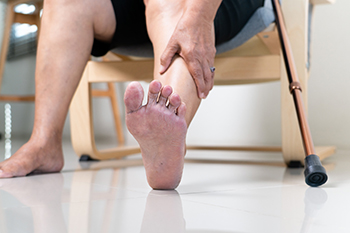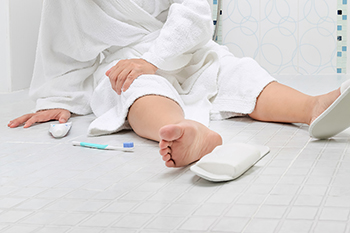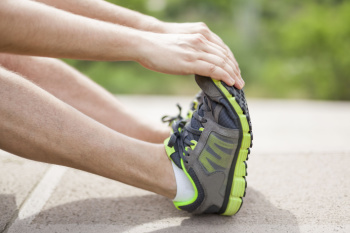Connect With Us
Blog
Items filtered by date: March 2024
Foot Pain in Older People

Foot pain in older people is often a result of various factors, including structural disorders like corns, calluses, nail disorders, bunions, and hammertoes. In addition, foot pain in older adults may be caused by systemic conditions such as osteoarthritis, rheumatoid arthritis, gout, and diabetes. This pain can significantly restrict mobility, inhibit daily activities, affect balance, and diminish overall quality of life. Seeking help from a podiatrist is essential for dealing with the many types of foot pain brought on by the aging process. Podiatrists specialize in addressing foot and ankle problems, offering expertise in assessing, diagnosing, and treating conditions specific to the feet. With their guidance, older individuals can receive personalized care aimed at relieving pain, improving mobility, and improving well-being. For help with foot pain, it is suggested that you make an appointment with a podiatrist.
Proper foot care is something many older adults forget to consider. If you have any concerns about your feet and ankles, contact Zina Cappiello, DPM from Dr. Zina B. Cappiello DPM, LLC. Our podiatrist can provide the care you need to keep you pain-free and on your feet.
The Elderly and Their Feet
As we age we start to notice many changes in our body, but the elder population may not notice them right away. Medical conditions may prevent the elderly to take notice of their foot health right away. Poor vision is a lead contributor to not taking action for the elderly.
Common Conditions
- Neuropathy – can reduce feeling in the feet and can hide many life-threatening medical conditions.
- Reduced flexibility – prevents the ability of proper toenail trimming, and foot cleaning. If left untreated, it may lead to further medical issues.
- Foot sores – amongst the older population can be serious before they are discovered. Some of the problematic conditions they may face are:
- Gouging toenails affecting nearby toe
- Shoes that don’t fit properly
- Pressure sores
- Loss of circulation in legs & feet
- Edema & swelling of feet and ankles
Susceptible Infections
Diabetes and poor circulation can cause general loss of sensitivity over the years, turning a simple cut into a serious issue.
If you have any questions please feel free to contact our office located in Clifton, NJ . We offer the newest diagnostic and treatment technologies for all your foot and ankle needs.
How Balance Exercises Can Help Seniors With Falls Prevention

Balance exercises can help seniors prevent falls, leading to serious injuries. As individuals age, balance and stability tend to decline due to muscle weakness and reduced awareness of the body’s movement. These exercises focus on challenging the body's equilibrium through activities like standing on one leg and heel-to-toe walking. By consistently practicing these exercises, seniors can enhance their ability to maintain balance in various situations, such as navigating uneven surfaces or recovering from sudden movements. Additionally, balance exercises promote better posture and body awareness, further decreasing the likelihood of falls. If you are a senior interested in preventing falls, it is suggested that you make an appointment with a podiatrist for a discussion of your current situation, and how you can incorporate balance exercises into your daily routine to maintain independence and quality of life as you age.
Preventing falls among the elderly is very important. If you are older and have fallen or fear that you are prone to falling, consult with Zina Cappiello, DPM from Dr. Zina B. Cappiello DPM, LLC. Our podiatrist will assess your condition and provide you with quality advice and care.
Every 11 seconds, an elderly American is being treated in an emergency room for a fall related injury. Falls are the leading cause of head and hip injuries for those 65 and older. Due to decreases in strength, balance, senses, and lack of awareness, elderly persons are very susceptible to falling. Thankfully, there are a number of things older persons can do to prevent falls.
How to Prevent Falls
Some effective methods that older persons can do to prevent falls include:
- Enrolling in strength and balance exercise program to increase balance and strength
- Periodically having your sight and hearing checked
- Discuss any medications you have with a doctor to see if it increases the risk of falling
- Clearing the house of falling hazards and installing devices like grab bars and railings
- Utilizing a walker or cane
- Wearing shoes that provide good support and cushioning
- Talking to family members about falling and increasing awareness
Falling can be a traumatic and embarrassing experience for elderly persons; this can make them less willing to leave the house, and less willing to talk to someone about their fears of falling. Doing such things, however, will increase the likelihood of tripping or losing one’s balance. Knowing the causes of falling and how to prevent them is the best way to mitigate the risk of serious injury.
If you have any questions, please feel free to contact our office located in Clifton, NJ . We offer the newest diagnostic and treatment technologies for all your foot care needs.
Essential Stretches for Runners to Prevent Injuries

In the pursuit of their passion, runners understand the importance of injury prevention through targeted stretching routines. Among the essential stretches for runners are calf stretches, which involve gently leaning forward against a wall to elongate the calf muscles and Achilles tendon. Another effective stretch is the quadriceps stretch, achieved by standing on one leg and pulling the opposite foot toward the glutes, helping to alleviate tension in the front thigh muscles. Hamstring stretches, performed while sitting or standing, aid in maintaining flexibility and reducing strain on the back of the thighs. Runners also benefit from incorporating dynamic stretches into their warm-up routines, such as leg swings and high knees, to increase blood flow and prepare the muscles for activity. By incorporating these stretches into their regimen, runners can help prevent injuries that may affect their feet. If you are interested in learning about additional stretches that can help prevent injuries, it is suggested that you consult a podiatrist.
All runners should take extra precaution when trying to avoid injury. If you have any concerns about your feet, contact Zina Cappiello, DPM of Dr. Zina B. Cappiello DPM, LLC. Our podiatrist will treat your foot and ankle needs.
How to Prevent Running Injuries
There are a lot of mistakes a runner can make prior to a workout that can induce injury. A lot of athletes tend to overstretch before running, instead of saving those workouts for a post-run routine. Deep lunges and hand-to-toe hamstring pulls should be performed after a workout instead of during a warmup. Another common mistake is jumping into an intense routine before your body is physically prepared for it. You should try to ease your way into long-distance running instead of forcing yourself to rush into it.
More Tips for Preventing Injury
- Incorporate Strength Training into Workouts - This will help improve the body’s overall athleticism
- Improve and Maintain Your Flexibility – Stretching everyday will help improve overall performance
- “Warm Up” Before Running and “Cool Down” Afterward – A warm up of 5-10 minutes helps get rid of lactic acid in the muscles and prevents delayed muscle soreness
- Cross-Training is Crucial
- Wear Proper Running Shoes
- Have a Formal Gait Analysis – Poor biomechanics can easily cause injury
If you have any questions, please feel free to contact our office located in Clifton, NJ . We offer the newest diagnostic and treatment technologies for all your foot care needs.
Heel Pain in the Morning?
Risks Posed by Cracked Heels
 Leaving cracked heels untreated poses several risks that can affect your health. When the skin on the heels becomes excessively dry and develops calluses, it leads to deep fissures or cracks. These openings increase the risk of foot infections and leave an entry point for bacteria. Cracked heels can also lead to pain, discomfort, and difficulty walking, which may interfere with day-to-day activities. In severe cases, untreated cracked heels may result in bleeding and increase the risk of cellulitis, a serious bacterial skin infection. Foot wounds may develop when cracked heels become infected, and this is especially important to avoid for people with diabetes and the associated loss of circulation in the feet. Cracked heels may also signal underlying health issues, such as vitamin deficiencies or thyroid disorders. If you have cracked heels, it is suggested you make an appointment with a podiatrist who can treat the issue and prevent complications.
Leaving cracked heels untreated poses several risks that can affect your health. When the skin on the heels becomes excessively dry and develops calluses, it leads to deep fissures or cracks. These openings increase the risk of foot infections and leave an entry point for bacteria. Cracked heels can also lead to pain, discomfort, and difficulty walking, which may interfere with day-to-day activities. In severe cases, untreated cracked heels may result in bleeding and increase the risk of cellulitis, a serious bacterial skin infection. Foot wounds may develop when cracked heels become infected, and this is especially important to avoid for people with diabetes and the associated loss of circulation in the feet. Cracked heels may also signal underlying health issues, such as vitamin deficiencies or thyroid disorders. If you have cracked heels, it is suggested you make an appointment with a podiatrist who can treat the issue and prevent complications.
Cracked heels are unsightly and can cause further damage to your shoes and feet. If you have any concerns, contact Zina Cappiello, DPM from Dr. Zina B. Cappiello DPM, LLC. Our podiatrist can provide the care you need to keep you pain-free and on your feet.
Cracked Heels
Cracked heels appear unappealing and can make it harder for you walk around in sandals. Aside from looking unpleasant, cracked heels can also tear stockings, socks, and wear out your shoes. There are several methods to help restore a cracked heel and prevent further damage.
How Do You Get Them?
Dry skin is the number one culprit in creating cracked heels. Many athletes, walkers, joggers, and even swimmers suffer from cracked heels. Age and skin oil production play a role to getting cracked heels as well.
Promote Healing
Over the counter medicines can help, especially for those that need instant relief or who suffer from chronic dry feet.
Wear Socks – Wearing socks with medicated creams helps lock in moisture.
Moisturizers – Applying both day and night will help alleviate dryness which causes cracking.
Pumice Stones – These exfoliate and remove dead skin, which allows for smoother moisturizer application and better absorption into the skin.
Change in Diet
Eating healthy with a well-balanced diet will give the skin a fresh and radiant look. Your body responds to the kinds of food you ingest. Omega-3 fatty acids and zinc supplements can also revitalize skin tissue.
Most importantly, seek professional help if unsure how to proceed in treating cracked heels. A podiatrist will help you with any questions or information needed.
If you have any questions, please feel free to contact our office located in Clifton, NJ . We offer the newest diagnostic and treatment technologies for all your foot care needs.

